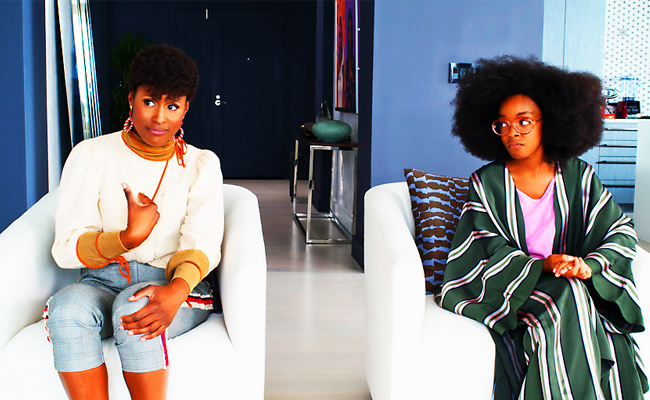
As I was walking into a movie called Little I overheard a guy tell his date, “It didn’t occur to me until now that it’s like the reverse of Big.”
That’s a pretty good self-contained joke right there and I chuckled smugly to myself about what an idiot you’d have to be to say something like that out loud. I took a bitchy sip of my diet soda and settled in. “Big in reverse,” I thought to myself. “Well obviously! This should be pretty good.”
Regina Hall, Issa Rae from Insecure, a body-swap plot… why not?
It wasn’t until Regina Hall’s character, Jordan Sanders, “the tech queen of Atlanta,” transformed into a 13-year-old girl that I realized the fatal flaw of a “Big in reverse” plot.
The beauty of Big or 13 Going On 30 is that it’s fun to watch a big star like Tom Hanks or Jennifer Garner act like a little kid for a whole movie. Now reverse that. And you’ve got… right, a little kid acting like Tom Hanks. Probably a lot less material there, right? It’s like School of Rock without Jack Black, or Billy Madison without Adam Sandler.
Not that Little doesn’t start off promising up until that point. Regina Hall’s Jordan Sanders is your typical ice queen business lady, comically demanding, yelling at her assistant for being asleep at 6 am and for not putting her slippers the correct distance from her bed. Jordan bullies everyone before they can bully her, a lesson she learned after a formative talent show mishap back in middle school. “It’s because you’re little,” her father tells her in the flashback scene. “Someday you’ll be big, and people will appreciate you for being smart. When you’re smart you get to be the boss.”
Equating smarts with financial success is a tragic miscalculation, though I do remember adults perpetuating that particular myth in the 90s. Issa Rae, meanwhile, plays Jordan’s long-suffering assistant, April, who spends her morning meditation listening to “How Not To Slap Your Boss” on Audiobook. Jordan’s employees scatter like cockroaches as she storms towards the office, everyone except the nerdy little girl who practices magic outside the office near her father’s doughnut truck (foreshadowing!), who reminds Jordan a little too much of herself at that age.
Into Jordan’s meticulously planned office space one morning comes Connor, played by Mikey Day, Jordan’s “biggest client” (whatever that means to an app developer), an obnoxious white guy who talks and dresses in an exaggeratedly “urban” manner and tells Jordan the rags-to-riches story of his success — which involved a loan from his dad that he expected would be $10 million and was only 5. He had to “hustle,” borrowing it from his grandparents. Connor is an excellent satire of an asshole tech CEO, the obvious counterpoint to the idea that you have to be smart to be the boss.
Between Connor and all the self-help, secular prosperity doctrine dogma Jordan lives and breathes (she has an Alexa-like AI assistant called “Homegirl”), which has made her rich but also insufferable, all the material is in place for some kind of critique of our collective success myths. But while Little frequently flirts with some kind of revelation, it always quickly retreats into exactly the kind of self-actualization platitudes that created Jordan in the first place. Be a boss! But be a nicer boss.
First though, Jordan has to be transformed into her sixth-grade self and go back to school. The school turns out to be the usual mix of mean bully cheerleaders (who weirdly seem to run the school with no adult supervision) and outcasts who are persecuted because of their intelligence, uniqueness, or disabilities. There’s little attempt to differentiate human nature from movie trope.
The promise of this premise is that Jordan will go back to middle school and maybe learn the lesson she should’ve learned the first time. The script has a difficult time connecting its message of “don’t be an asshole” with its method of being 13 again. How does being 13 teach you to be better? Is it fear of physical violence? One scene does overtly advocate spanking (couched in an hoary joke about “black momma whoopin’).
In the face of constant bullying, Young Jordan, played by Marsai Martin, is forced to befriend the class outcasts. How will her adult brain think them out of social purgatory? Mostly she uses her black card (she may be a kid but she’s still rich!) and lavish apartment to buy them cool clothes and post jealousy-inducing pics to Instagram. I guess there’s a lesson in there somewhere? Little sure seems to want there to be one.
Of course, the bigger issue is the more technical one: the fact that Regina Hall disappears from most of the movie, reducing her chemistry with Issa Rae to a non-factor. Marsai Martin tries valiantly but this is just asking too much of her. I don’t know that there’s a 13-year-old alive who could pull this off. It’s not as if there are just a bunch of teenage Tom Hankses walking around out there. There aren’t even adult Tom Hankses walking around out there.
Little would’ve required Oscar-caliber writing and a once-in-a-lifetime child actor to pull off, and it just doesn’t have those. It has Regina Hall but it can’t use her.
‘Little’ opens in theaters this weekend. Vince Mancini is on Twitter. You can find his archive of reviews here.






